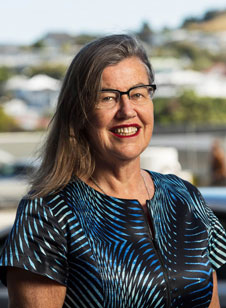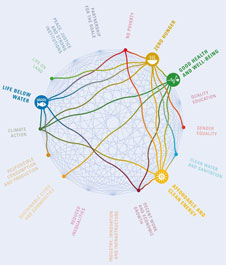 Tuesday 6 June 2017 12:26pm
Tuesday 6 June 2017 12:26pm
Professor Philippa Howden-Chapman
Not all good policies, in isolation, lead to an overall good outcome. Interactions and linkages between policies are what will lead us towards a more sustainable world, according to a new International Council for Science (ICSU) report.
A group of researchers are calling for New Zealand policy-makers to urgently focus on positive interactions between different government policies and keep alert to the negative effects of others.
Professor Philippa Howden-Chapman from the University of Otago, Wellington (UOW) together with 21 scientists from around the world, authored this major new report, which addresses the challenge of achieving the UN Sustainable Development Goals (SDGs).
“New Zealand, as a member of the United Nations, is expected to report regularly as to how it is achieving the SDGs. An integrated approach is essential,” says Professor Howden-Chapman.

ICSU graphic depicting the complex web of SDG interactions, highlighting the four analysed in this report.
The UN SDGs were adopted in 2015 as a universal set of goals to guide sustainable development to 2030. They cover issues from sustainable cities to clean water to gender equity and good governance. The 17 goals, and their specific targets, are intended to set the world on a course toward inclusive, sustainable development.
In the new report A Guide to SDG Interactions: from Science to Implementation, the scientists considered interactions between different goals and targets, determining to what extent they reinforce or conflict with one another. It includes detailed analyses of four of the UN's 17 Sustainable Development Goals to help illustrate the value of this integrated approach.
“We need to make the most of important linkages offered by the SDGs, such as linking health and well-being policies with urban development, housing, transport and climate change,” she says.
Professor Howden-Chapman along with UOW's Dr Elinor Chisholm and Associate Professor Ralph Chapman at Victoria University of Wellington, and colleagues at the United Nations University and the University of Sydney, co-authored the SDG 3 chapter on health and wellbeing.
“The report shows, for example, that investing in environmental protection helps the goal of improving economic growth to support the goal of improved health,” says Professor Howden-Chapman, who leads the NZ Centre for Sustainable Cities (NZCSC).
“The NZCSC is a model of collaboration and cross-disciplinary work. We were chosen to contribute to this international report due to our systems approach to urban work. We are helping to pioneer the use of big data to analyse different policies and their effects on health and well-being.”
The NZCSC is hosted at the University of Otago, Wellington and includes researchers from other universities and organisations such as Victoria University of Wellington and NIWA.
“The new ICSU report is an important tool for policymakers across all sectors to prioritise, implement and achieve the SDGs, ensuring that working towards each goal supports the achievement of other goals,” says Professor Howden-Chapman.
Read the full report: A Guide to Sustainable Development Goal (SDGs) Interactions: from Science to Implementation
For further information, please contact:
Professor Howden-Chapman
Department of Public Health,
University of Otago, Wellington
Email: philippa.howden-chapman@otago.ac.nz
Dr Elinor Chisholm
Department of Public Health,
University of Otago, Wellington
Email: Elinor.chisholm@otago.ac.nz
A list of Otago experts available for media comment is available elsewhere on this website.
Electronic addresses (including email accounts, instant messaging services, or telephone accounts) published on this page are for the sole purpose of contact with the individuals concerned, in their capacity as officers, employees or students of the University of Otago, or their respective organisation. Publication of any such electronic address is not to be taken as consent to receive unsolicited commercial electronic messages by the address holder.
